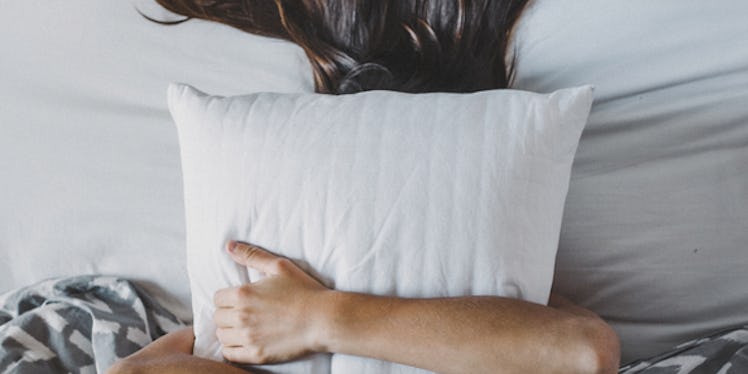
This Is What Your Body Is Trying To Tell You If You Can’t Fall Asleep At Night
Those endless nights when you can't seem to stop fluffing your pillow in an attempt to get comfortable are an IRL nightmare.
Maybe it's school, work, or a big project at the office that's keeping your mind busy, or that dessert espresso you sipped on just a few hours ago that's keeping you up at night.
Whatever the case, you're awake, and your body is shaming you for it.
You pay close attention to your body during the day and respond when it indicates the necessity for nourishment, so why wouldn't you do the same in terms of sleep?
Oftentimes, sleeping problems stem from anxiety, as your nervous system tries to respond to stress caused by school, work, family, and well, life.
But sometimes, falling asleep is a struggle due to choices you're actively making day-to-day.
If you're having trouble snoozing, here's what your body might be trying to tell you.
Regulate Your Sleeping Habits
Andrew W. Varga, MD, PhD, assistant professor of medicine in the Mount Sinai Integrative Sleep Center, tells Elite Daily,
Sleep is homeostatically regulated, meaning the more you go without sleep, the more you need it (and the more you sleep, the less you need it). This has practical implications for someone having trouble sleeping at a normal bedtime (say 11 p.m.), but who has dissipated sleep pressure by having napped earlier in the day at, say, 10 a.m. and 4 p.m. In someone like this, naps should be avoided.
Time is of the essence, and so is sleep.
Set a time frame for yourself to start getting ready for bed. Getting into a routine will train your brain to start winding down when it's time to snooze.
Cut Down On Caffeine
This one should be a no-brainer, as caffeine is a stimulant. If you need a double-shot of espresso for a jolt of energy every morning, you're well aware of the superpower effects coffee can have on the body.
Varga suggests,
Caffeine and nicotine are two of the most common stimulants, and so either in high quantity or close to routine bedtime will inhibit sleep.
Rule of thumb? If it wakes you up in the morning, avoid consumption before bed.
Sign Off And Stop The Scroll
Thanks to the invention of smartphones, counting sheep has become an urban legend, replaced by skimming through social media and counting likes on Instagram.
According to Vargas, "anything with a backlit screen (TV, monitor, tablet, mobile phone) emits a very high percentage of blue spectrum light, which is sensed by non-image forming retinal neurons called retinal ganglion cells, which project directly to the hypothalamus and promote wakefulness."
He continues,
Therefore, exposure to blue light is good in the morning, but is something to generally avoid in the hours before bedtime. We usually recommend that patients turn off all electronic devices one hour before routine bedtime.
Basically, once you slip into something comfy, that's your cue to sign off.
Say No To Extended Happy Hours
A little bit of alcohol before bed can actually help you fall asleep (ever heard of a nightcap?), but it's important to know how much is too much.
Vargas says,
Alcohol changes sleep architecture, and suppresses some of the deeper stages of sleep. We generally recommend any alcohol be consumed well before routine bedtime.
Going out after a long day at the office for a cocktail or two with coworkers can be a sigh of relief, but know when to cut yourself off so you'll be able to rest when you get into bed.
Avoid Working In The Bedroom
You can work from home; just don't do it in the bedroom.
It can be tempting to hop into bed and work on assignments from under the covers, but doing so will actually create a subconscious connection between conference calls and your comforter, causing your brain to resist sleep because, hello, shouldn't you be answering emails when using that pillow?
Just like you wouldn't mix work with pleasure, don't mix bed with business.
Got it? Good(night).